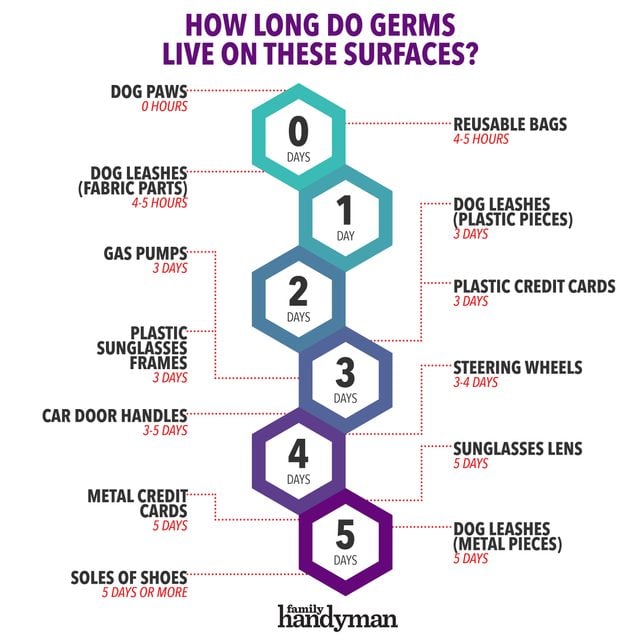How Long Germs Last on 9 Not-So-Common Surfaces
Updated: Oct. 23, 2023
Germs can live up to five days on some surfaces. Here's what to know and how to stay safe and healthy.
Viruses and other germs can linger on surfaces long after someone touches them. The length of time germs remain can range from a few hours to several days. (Yikes!)
Viruses and germs typically live longer on hard surfaces like plastic and stainless steel than porous surfaces like fabric and paper. That’s because porous materials are better at absorbing and trapping pathogens, making it harder to spread germs through touch. Viruses also live longer in lower temperatures, low humidity and low sunlight.
Knowing how long germs live on different kinds of surfaces and how to properly disinfect those surfaces goes a long way toward keeping you and your family safe. Here are nine not-so-common surfaces worth knowing about.

On This Page
Soles of Shoes
A recent study confirmed that viruses can live on the soles of shoes. Keep germs at bay by removing your shoes before entering your home and regularly cleaning your shoes, according to the manufacturer’s instructions. Another option is to use antibacterial alcohol-based wipes to disinfect soles.
Dog Leashes
Most dog leashes are made of cotton or nylon and contain a metal clip. Plastic may also be a part of the mix, especially if you have a retractable dog leash. Germs can live up to five days on metal, three days on plastic and several hours on fabric. Your best bet is to avoid touching your face while using the leash and to follow the Centers for Disease Control and Prevention (CDC) guidelines to wash your hands with warm water and soap for 20 seconds after taking your dog for a walk. You can also hand-wash most dog leashes in a basin of hot water mixed with one tablespoon of dog shampoo. Let the leash soak for 10 minutes, rinse and air dry.
Dogs Themselves
Good news: There’s no evidence that dogs can give you a virus or other infection. So there’s no need to bathe them obsessively (Find out how often you should bathe your dog). Also, skip outfitting them with a face mask — besides looking funny, it could create breathing difficulties for your pup. That said, the CDC does recommend washing your hands before and after touching your pet. Those looking to play it extra safe can clean their dogs‘ paws with water and dog shampoo or with paw wipes like Pogi’s Grooming Wipes.
Reusable Grocery Bags
Besides harboring viruses for several hours, reusable grocery bags can also play host to bacteria such as E. Coli, yeast and mold. For that reason, it’s recommended you clean your reusable grocery bags after every use. (If you’re immunocompromised or especially worried about getting sick, you might consider switching to disposable grocery bags.)
Steering Wheels
Sorry to break it to you, but your car steering wheel is most likely teeming with germs. A British researcher revealed that a steering wheel can contain up to nine times the amount of germs that are found on a public toilet! Steering wheel surfaces tend to be made of less porous materials, so viruses could potentially live on them for several days. Most steering wheels can be disinfected with an EPA-approved disinfectant and a soft cloth. (Avoid paper towels, which can scratch a car’s interior.) Leather and more delicate materials are best cleaned with mild soap and water.
Car Door Handles
Cars and their door handles are made of metal, one of the surfaces where viruses live the longest — up to five days. So it’s a good idea to regularly disinfect car door handles with rubbing alcohol or disinfectant wipes.
Gas Pumps
Hundreds of people touch a gas pump every day, and viruses on the gas pump handle can live for up to 72 hours. Keep yourself safe by running an antibacterial alcohol-based wipe over the handle before using it. You might also consider slipping on disposable latex or nitrile gloves before pumping and tossing them when you’re done. Finally, it’s always a good idea to wash your hands or use a hand sanitizer when you’re done fueling.
Eyeglasses
Eyeglass frames are made of plastic, which viruses can live on for up to three days. What’s more, they can live for up to five days on the glass lens. That’s troubling when you consider your spectacles sit so close to your eyes, nose and mouth where pathogens typically invade. Your best bet is to avoid touching your glasses as much as possible and to clean them often. Start by running them under lukewarm water, then use a dish detergent to thoroughly clean every part of the lens and frame. Finish up by drying them with a clean, soft, lint-free cloth.
Credit Cards
Viruses can attach themselves to your plastic payment cards for up to three days, so keep them germ-free by disinfecting after every use. Clean them for 20 seconds with good old soap and water or use an EPA-approved disinfectant for killing viruses. Just make sure your signature is still visible. If not, sign the card again after it dries. It’s a good idea to clean your wallet in general once you’re done with the payment cards.
